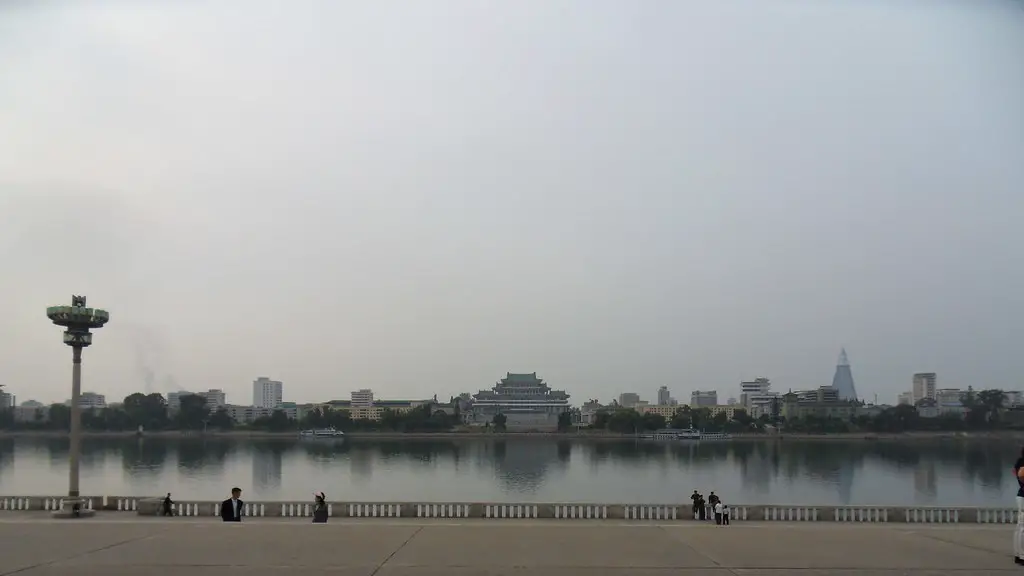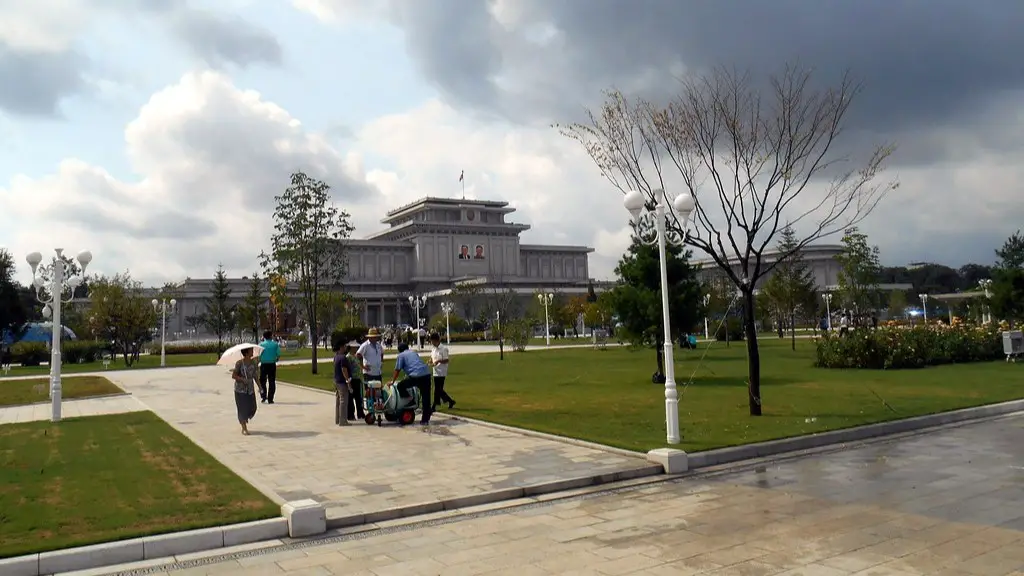Origin of North Korean Nuclear Program
The North Korean nuclear program began in the early 1950’s when the country was still under the rule of Kim Il-sung. At this time, North Korea signed a mutual defense agreement with the Soviet Union, which provided them with assistance in developing a nuclear weapon. In the 1960s, North Korea began construction of two nuclear research facilities, and in 1975, the country signed the Nuclear Non-Proliferation Treaty (NPT).
North Korea agreed to the NPT despite the fact that they were not receiving the economic rewards promised by the Soviet Union. Consequently, they sought to become a nuclear power in order to increase their bargaining power. In the 1990s, they began to secretly pursue the development of nuclear weapons.
Investigation Into North Korean Nuclear Capabilities
International organizations such as the International Atomic Energy Agency (IAEA) and the United Nations (UN) have conducted extensive investigations into North Korea’s nuclear capabilities. In 2002, the IAEA visited North Korea and discovered that a covert uranium enrichment program had been established.
The international community responded to this revelation with sanctions and diplomacy efforts. However, North Korea refused to cooperate, and in 2006, the country conducted its first nuclear test. Despite continued attempts by the international community to impose sanctions and negotiate with North Korea, the country proceeded to increase its nuclear arsenal.
North Korea’s Nuclear Weapons Capacity
Today, North Korea is believed to be in possession of up to 20 nuclear warheads, as well as chemical and biological weapons. It is believed that they obtained the fissile material and technology necessary to produce their own weapons through international cooperation with various countries, including China, Russia and Pakistan.
These countries are believed to have offered assistance in the form of construction of nuclear facilities, training of personnel and technical advice. North Korea has also developed the capability to launch intercontinental ballistic missiles, although the exact nature and extent of this capability remains unknown. In addition, the country has not allowed international inspectors access to its nuclear facilities, making it difficult to ascertain the extent of its nuclear capabilities.
North Korea’s Nuclear Strategy
North Korea’s nuclear program is believed to be a defensive measure taken by the country to protect itself from outside threats. This is evidenced by the fact that North Korea has not conducted any nuclear tests since 2017, and in 2018, they declared a moratorium on missile tests.
Despite this show of goodwill, North Korea still remains a major threat to the international community. The country is believed to have enough nuclear material to produce more nuclear weapons in the future, and their lack of transparency regarding the development of their nuclear program makes it difficult to predict their next move.
International Response to North Korean Nuclear Weapons
The international community has responded to North Korea’s nuclear weapons program with a combination of diplomatic efforts, economic sanctions, and military actions. The United Nations has passed a series of resolutions condemning North Korea’s nuclear activities, and the US and its allies have imposed severe economic sanctions on the country in an effort to bring them to the negotiating table.
In 2018, diplomatic efforts culminated in the historic summit between US President Donald Trump and North Korean leader Kim Jong-un. The two sides agreed to work towards complete denuclearization of the Korean Peninsula, although progress has been slow and there have been reports of North Korea continuing to expand its nuclear arsenal.
North Korean Nuclear Relationship With China
China has played a significant role in the development of North Korea’s nuclear program, both directly and indirectly. China has long been North Korea’s main economic and political ally, and is believed to have supported North Korea’s nuclear program both financially and with resources.
At the same time, China has sought to restrain North Korea and has urged them to abandon their nuclear weapons program. However, China has been reluctant to use economic or military pressure to push North Korea in this direction, due to fears of triggering a conflict on the Korean Peninsula.
Evaluation of North Korea’s Nuclear Program
North Korea’s nuclear program has been met with a mix of condemnation and trepidation from the international community. On the one hand, the development of nuclear weapons represents a major danger to global security, as it could potentially trigger a nuclear conflict.
On the other hand, North Korea’s nuclear capabilities serve as a deterrent, and their willingness to engage in diplomacy and negotiations with the US has provided some hope that a diplomatic solution to the crisis can be found.
North Korean Nuclear Technology in the Modern World
Despite international condemnation, North Korea’s nuclear program has advanced significantly, and their nuclear weapons are now considered to be among the most advanced in the world. North Korea’s nuclear technology has become increasingly sophisticated, and the country is believed to be capable of producing a variety of nuclear weapons and delivery systems. The country has also developed a space launch vehicle which could potentially be used to launch nuclear weapons, and they are believed to be working on a submarine-launched nuclear missile system.
Furthermore, North Korea is believed to have the capability to produce miniaturized nuclear weapons, which are easier to conceal and can be deployed more quickly. This could significantly increase their ability to launch a first-strike against an adversary.
Assessment of North Korea’s Global Role
North Korea’s nuclear weapons program has made them a major player in global politics, and has changed the geopolitical balance of power in East Asia. North Korea’s nuclear weapons program has forced the US and its allies to take a more aggressive stance toward the country in order to deter any potential military action.
At the same time, North Korea’s nuclear weapons have made it difficult for the US and its allies to take a more conciliatory approach, as any diplomatic solution must take into account the fact that North Korea’s nuclear capabilities cannot be simply ignored.
North Korea’s Impact on the Global Non-proliferation Agenda
North Korea’s nuclear weapons program has had a major impact on the global non-proliferation agenda. The international community has argued that North Korea’s development of nuclear weapons has set a dangerous precedent and has undermined the credibility of the non-proliferation regime.
Furthermore, North Korea has refused to cooperate with the international community, making it difficult to assess the extent of the country’s nuclear capabilities. This has made it difficult for the international community to establish a lasting non-proliferation regime, and has raised fears that other countries may follow North Korea’s example and pursue their own nuclear programs.
International Cooperation To Combat North Korean Nuclear Threat
In order to combat the North Korean nuclear threat, the international community has focused on strengthening diplomatic ties, increasing economic pressure, and engaging North Korea in dialogue. The US and its allies have sought to impose harsh economic sanctions in an effort to convince North Korea to abandon their nuclear weapons program, but the effectiveness of such sanctions is difficult to ascertain.
The US and its allies have also encouraged China to take a more active role in resolving the crisis, as China’s economic ties with North Korea give them sway over the country’s decision-making process. In addition, the international community has called for increased dialogue and engagement with North Korea in order to address their security concerns and find a peaceful resolution to the crisis.
Conclusion
North Korea’s nuclear program is a major source of international concern, and has changed the geopolitical dynamics of East Asia. The international community has responded to the threat by imposing economic sanctions and encouraging dialogue, but North Korea has so far refused to cooperate. The country’s nuclear program has also had an impact on the global non-proliferation regime, as it has raised fears that other countries may seek to develop their own nuclear weapons. The international community must continue to work together to find a diplomatic solution to the crisis and ensure the security of the region.



